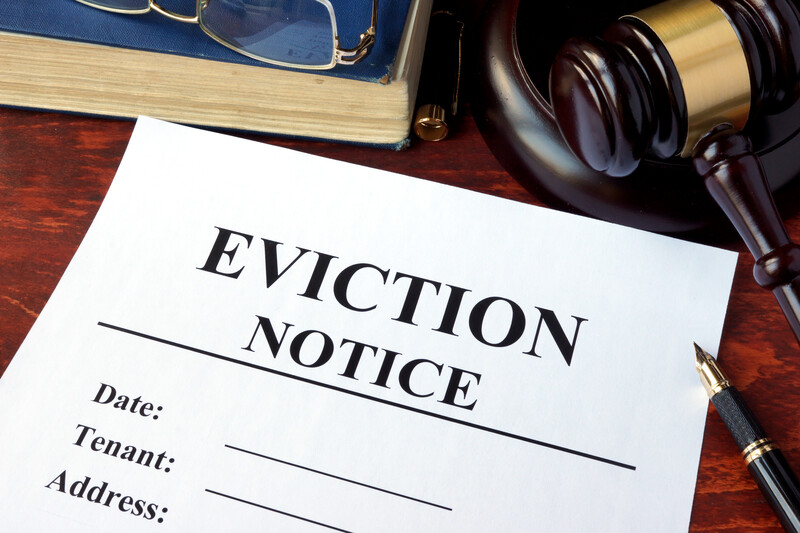Tenant eviction is a hot topic that many landlords and property managers are dealing with. It can be difficult to manage tenant evictions without having the tenant go through court, but there are other ways to get them out of your property. In this blog post, we will discuss how you can evict a tenant in different ways so you don’t have to go through the court system! If they don’t pay rent or violate their lease agreement terms, then landlords and property managers have every right to legally evict them!
Tenant Eviction Options:

First Option:
Landlords have the right to evict a tenant for not paying rent. If they don’t, you can begin eviction proceedings by issuing the notice of non-payment and waiting until it expires before filing an eviction lawsuit with your local county court. This typically takes about 20 days total from beginning to end.
Second Option:
Another tenant eviction option is to evict them for failing to pay rent, but also because they violated the tenant agreement. When you issue a tenant with this notice of non-compliance and give them 48 hours to fix it, they need to correct their behavior within that time frame or else move out immediately. This can take about 20 days from the beginning until the end as well.
Third Option:
You can evict a tenant without going to court if the tenant has violated the terms of their lease agreement and you have provided them with an opportunity to fix it in 48 hours. If they don’t, then you must file eviction papers within two days after that time expires and file with your local county or district court clerk’s office. Keep in mind that it can take about 20 days to complete this tenant eviction process.
Fourth Option:
The tenant must be behind on their rent by at least 15 days, they violated the lease agreement terms and you have given them an opportunity of 48 hours to correct their behavior or move out immediately. If they don’t meet these conditions within two business days after the tenant eviction notice expires, then you must file tenant eviction papers with your local county court clerk’s office. Again, this can take about 20 days from beginning to end and is a tenant eviction option that does not require going through court.
Can section 8 tenants be evicted?
Yes, tenant eviction is possible for section eight tenants. You can evict them if they don’t pay their rent or violate other terms in the tenant agreement. If you have followed all of your state’s tenant eviction laws and procedures properly to get rid of a tenant with section eight vouchers, there are no restrictions on whether you can keep them out of the property.
How To Serve An Eviction Notice:
As a tenant eviction tips and advice, if you need to file tenant eviction papers in court or evict the tenant within two business days after their opportunity of 48 hours expires – make sure that they are served with one of these three forms:
- 24-hour notice for illegal activities on your property (such as drug activity)
- 48-hour tenant eviction notice for nonpayment of rent
- tenant eviction notice for lease violations (such as having pets on the property when prohibited)
When you serve these types of tenant eviction notices, make sure that it is done in person and not by mail to avoid any complications with the process. Make sure that you have all tenant eviction papers and forms in order before proceeding with this tenant eviction option.
What if a tenant refuses to leave?
If tenant eviction papers are filed and the tenant does not leave after being served, you will need to file a “Forcible Entry and Detainer” lawsuit against them. This may result in further tenant evictions proceedings that could have been avoided if they just left on their own accord.
Keep these tips in mind when evicting your tenant or tenants:
- Give them a tenant eviction notice that is legal and not discriminatory or retaliatory.
- Make sure your tenant eviction notices are clear, concise, and complete to avoid tenant evictions from being delayed because you didn’t give enough information.
- Follow the time limits for each tenant eviction type as closely as possible to make it go as quickly and smoothly as possible.
If you follow these tenant eviction tips, then the tenant eviction process should go fairly quickly with little to no damage done on either end!
Conclusion:
There are many tenant eviction options that you can choose from when the tenant doesn’t pay rent or violates their lease agreement. Keep in mind that tenant eviction takes some time and there is a right way to go about it so you don’t have any issues with your tenant, such as the filing for bankruptcy or staying beyond the tenant eviction process. If you want to learn more about tenant eviction and tenant rights, contact a tenant eviction attorney!








Add Comment